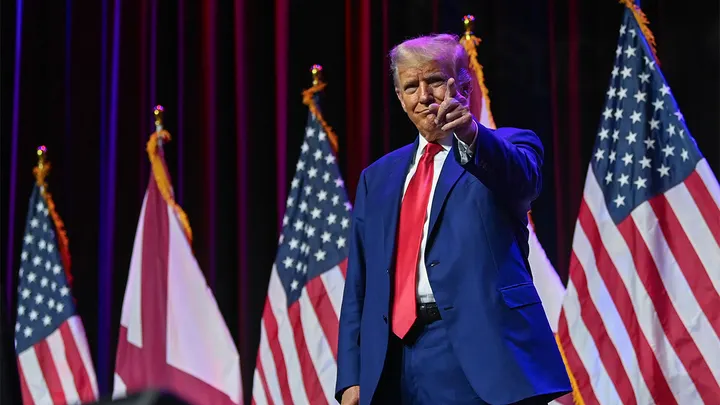A Democrat activist tried to trademark ‘Trump Too Small’ to print on T-shirts after a crude joke made by Sen Marco Rubio in 2016
On Wednesday, the Supreme Court will discuss a case involving the Patent and Trademark Office (PTO) and alleged violations of the First Amendment. The case revolves around the PTO’s refusal to grant registration for a political slogan on T-shirts criticizing former President Donald Trump without his express consent.
The main issue in this case revolves around the intersection of First Amendment rights with the right to privacy, especially in cases where the trademark is critical of a government official or public figure.
In 2017, Steve Elster, a politically active Democrat attorney in California, wanted to sell T-shirts with the phrase “Trump Too Small” printed on them. The phrase originates from an exchange on the floor of a 2016 debate between Trump and Sen. Marco Rubio, R-Fla. The Florida senator made a crude joke referring to the size of the former president’s hands.
However, when Elster tried to obtain a trademark for the slogan, the PTO denied his request, and this denial was affirmed by the Trademark Trial and Appeal Board. The reasoning behind these decisions was that the trademark in question identified Donald Trump without his express consent.

However, a federal circuit court later overturned this decision, asserting that Elster’s trademark was fundamentally related to the core principles of the First Amendment. “The government has no interest in suppressing speech critical of public officials or public representatives in the context of trademarks,” the court asserted.
Representing Katherine Vidal, the under-secretary of commerce for intellectual property, the Justice Department took the case to the Supreme Court. Their argument was based on the belief that the Lanham Act, a federal statute designed to safeguard intellectual property in trademark registrations, provides the PTO with constitutional grounds to reject Elster’s trademark application.
The Justice Department’s petition to the Supreme Court asserted, “When registration is declined due to a mark that ‘[c]onsists of or comprises a name… identifying a particular living individual’ without ‘his written consent,’ ‘no speech is being restricted; no one is being punished.’
Fara Sundarjee, a partner at international law firm Dorsey & Whitney, believes that while the surface-level focus may be on Trump or the content of his policies, the core of the case does not revolve around those elements.
At a time when the country is deeply divided and the 2024 presidential candidates begin their campaigns, Sundarjee suggests that the central question is whether the decision is likely to curtail free speech, especially in the context of political criticism. Trademark Applicant Mr. Elster, argues that this is indeed a problem.
“So, what’s the likely outcome? If the court upholds the Federal Circuit’s opinion, will the USPTO be inundated with trademark applications for every political phrase containing the name of a candidate in the 2024 election? Probably not. Will everyday life be filled with t? Are there shirts with slogans bearing the names of the 2024 candidates by unrelated third parties? I hope not,” Sunderji concluded.
Arguments will begin at 10 am on Wednesday.
